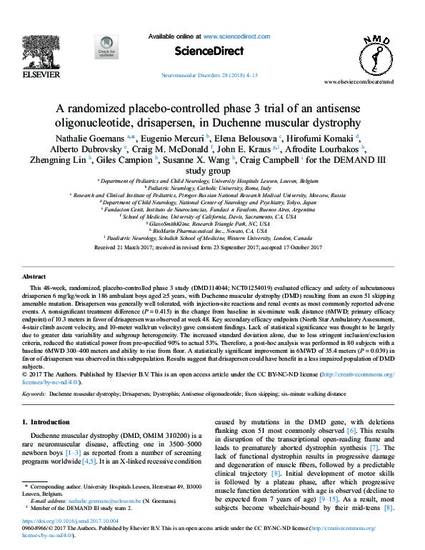
This 48-week, randomized, placebo-controlled phase 3 study (DMD114044; NCT01254019) evaluated efficacy and safety of subcutaneous drisapersen 6 mg/kg/week in 186 ambulant boys aged ≥5 years, with Duchenne muscular dystrophy (DMD) resulting from an exon 51 skipping amenable mutation. Drisapersen was generally well tolerated, with injection-site reactions and renal events as most commonly reported adverse events. A nonsignificant treatment difference (P = 0.415) in the change from baseline in six-minute walk distance (6MWD; primary efficacy endpoint) of 10.3 meters in favor of drisapersen was observed at week 48. Key secondary efficacy endpoints (North Star Ambulatory Assessment, 4-stair climb ascent velocity, and 10-meter walk/run velocity) gave consistent findings. Lack of statistical significance was thought to be largely due to greater data variability and subgroup heterogeneity. The increased standard deviation alone, due to less stringent inclusion/exclusion criteria, reduced the statistical power from pre-specified 90% to actual 53%. Therefore, a post-hoc analysis was performed in 80 subjects with a baseline 6MWD 300-400 meters and ability to rise from floor. A statistically significant improvement in 6MWD of 35.4 meters (P = 0.039) in favor of drisapersen was observed in this subpopulation. Results suggest that drisapersen could have benefit in a less impaired population of DMD subjects.
Available at: http://works.bepress.com/craig-campbell/11/

Under CC Attribution-NonCommercial-NoDerivatives 4.0 license